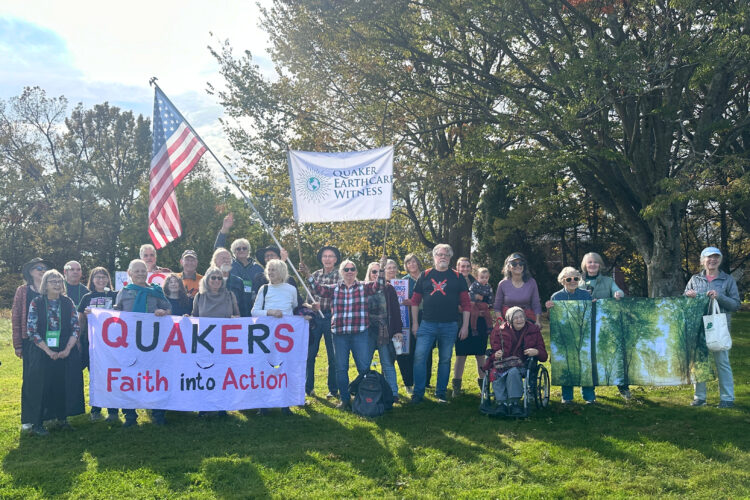Melting the Ice in Our Hearts

The ice is melting in the north. The only way to change our ways is to melt the ice in our hearts.
This is a slightly paraphrased statement from Angaangaq Angakkorsuaq, an indigenous leader from Greenland, one of the many inspiring speakers at the Religions for the Earth forum that was held at Union Theological Seminary as a lead up to “climate week” in New York City. I was honored to represent Quaker Earthcare Witness at the forum along with 250 faith leaders from all over the world. The forum included presentations, prayers, workshops and rituals on Friday and Saturday, time for the People’s Climate March on Sunday, and an interfaith service at St. John the Divine Cathedral on Sunday evening.
Here is a sampling of some of what we heard and experienced :
- “May this be the season when we all wake up” Rabbi Ellen Bernstein
- “The earth is our relative, not a resource.”
- “(Science, economics, etc.) has not changed the dangerous direction we are on, so we pray…we pray for (repentence, convergence, courage, each other) to turn around and walk in another direction.” Jim Wallis
- “Climate change is the greatest environmental justice issue of all times— for today, and for future generations.” And “Optimism is the only option.” Thomas Lovejoy
- “This is a moment of change.” Mary Evelyn Tucker
- “If we had waited for guidance from the traditional church 30 years ago, we would not have started Genesis Farms. Our guidance came from the land.” Sister Miriam MacGillis
- “We need to be subjects of rights, not objects of rights.” And “The indigenous people of the world did not cause this problem, but we are part of the solution.” Ana Francisca Perez, Mayan leader
- “We must rekindle the moral voice in the halls of Congress.” Jose Aguto, FCNL
- “Climate change is not an environmental issue; it is a social issue.” Larry Schweiger, National Wildlife Federation
- “The logic of domination in slavery is the same logic used to dominate the environment.” And “We must link social justice and earth justice that we all might be free.” As well as “Faith gives us optimism.” Melanie Harris
- And one person quoted Christiana Figueres, executive secretary of the UN framework on climate change: “I can’t believe the faith community is so asleep at the wheel.”
- “To respect and forgive are the first medicines.” Chief Looking Horse
- “You cannot defeat darkness with anything but love.” Koran
- “We cannot reach peace and justice without the faith traditions of each other. Miracles are happening—let us continue to draw strength from each other.”
A few concrete ideas came out of the forum, and I’m sure many more will follow in the months ahead. The Our Voices campaign has been launched (http://ourvoices.net) with three projects: (1) a massive online petition to demonstrate peoples’ support for action on climate change, much as the March was meant to show
huge outpouring of public support; (2) an area for collecting and telling stories about the faith comunities’ commitment and action on climate change; and (3) a project for publicly voicing our concerns and globally synchronizing actions (such as ringing bells, clanging gongs, etc.).

The People’s Climate March extended as far as the eye could see: 400,000 strong.
The religious community that was represented at the forum was clearly supportive of climate action now and one of the exciting aspects of the forum was linking religious leaders with scientists. Dr. Rajendra Pachauri, chair of the IPCC, pleaded with religious leaders to incorporate climate change action in all that we do within our communities. He knows as well as anyone that scientists have been reporting on the significance of climate change for many, many years with very little action at the international level. The religious community has the ability to reach our hearts.
The forum concluded with a sense-of-the-meeting poem composed in-the-moment by Terry Tempest Williams, who created her poem using comments she heard in the final session. She said: “May we stand in the center of this crisis with love.”

